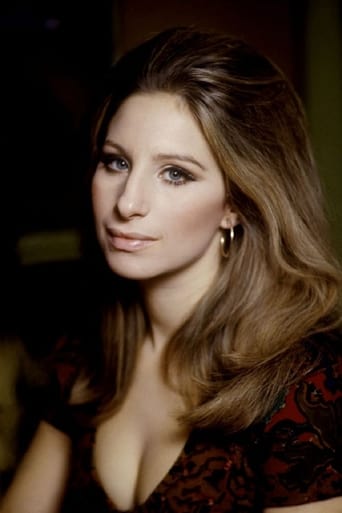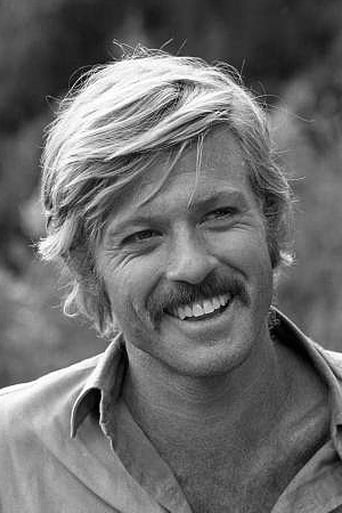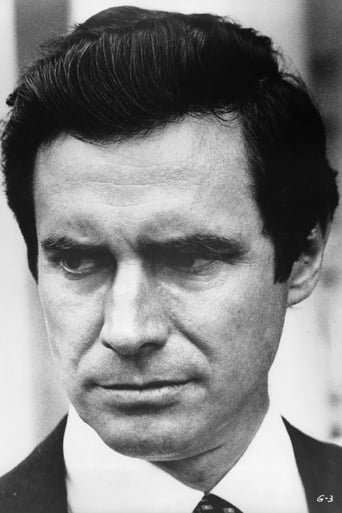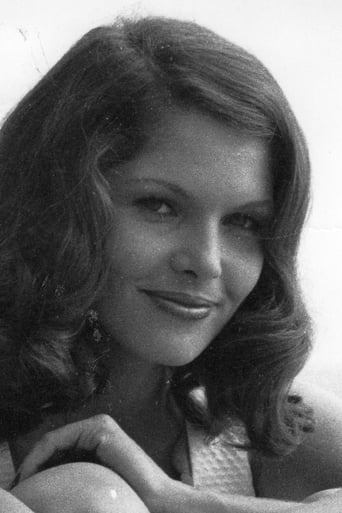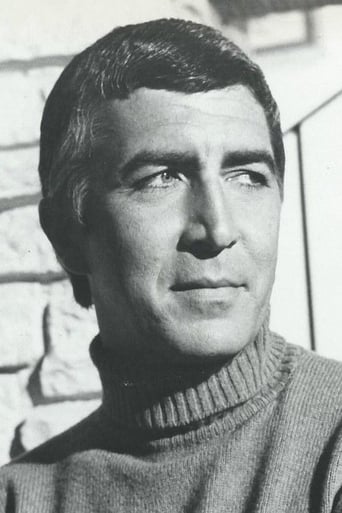Linkshoch
Wonderful Movie
Vashirdfel
Simply A Masterpiece
Moustroll
Good movie but grossly overrated
Ginger
Very good movie overall, highly recommended. Most of the negative reviews don't have any merit and are all pollitically based. Give this movie a chance at least, and it might give you a different perspective.
HotToastyRag
If you haven't seen The Way We Were, you're missing one of the great classic romances. Watching it isn't a guarantee that you'll like it, but at least you'll be able to say you've seen it. Two of the biggest stars of the 1970s, Robert Redford and Barbra Streisand, unite in this unforgettable love story that supports the great theory of opposites attracting.Robert Redford, in his infinite handsomeness, comes from a privileged background and meets the stubborn, politically active Barbra Streisand in college in the 1930s. While she argues about Marxism and social injustice, he prefers to enjoy the simple and finer things in life. Somehow—you'll have to watch the movie to find out—the unlikely pair fall in love, but because of their dynamic, it's not always smooth sailing. "You push too hard," Bob says to Babs in one memorable argument. "Oh, but look what I got," she smiles. If there's a woman in the audience who doesn't tear up during that line, I'll give her a refund on her ticket price.Parts of the movie are sweet, parts are frustrating, and parts are hard to watch as Arthur Laurents captures the realism of difficult relationships. But if you're a fan of either of the actors, or like watching classic love stories like Love Story or When Harry Met Sally, you need to add this movie to your weekend watch list. Stock up on Kleenex and popcorn, and get ready to fall in love with Robert Redford.
disinterested_spectator
This movie begins in 1944. Katie runs into Hubbell, a good-looking guy she met in college and whom she had a crush on. But as she is rather homely, her love for him was hopelessly unrequited. She invites him up to her place for a cup of coffee, but he is so drunk that without realizing what he is doing when he comes out of the bathroom, he gets undressed and falls asleep in her bed. She gets naked, slides into bed with him, and encourages him. Without really knowing what he is doing, he has sex with her, and she hopes he knows it is Katie he is making love to. But by the next morning, it is clear that he has no memory of what happened, and he merely thanks her for letting him sleep there.In evaluating this scene, we must do so from the vantage points of three different periods: the end of World War II, when the scene took place; the early 1970s, when the movie was made; and the twenty-first century, when we watch this movie today. In other words, each of these three different periods will tend to yield three different moral judgments about that sex scene.But first, let us reverse the sexes. By today's standards, if a man were to have sex with a woman while she was too drunk to know what she was doing, that would be rape, for she would be in no condition to consent. However, in accordance with twenty-first century egalitarianism, we would not limit it to just a man doing that to a woman. Rather, we would say that if one person had sex with a second person when that second person was too drunk to know what he or she was doing, then the first person has raped the second person. This allows for the possibility that a woman could rape a man, a man could rape a man, and a woman could rape a woman. In other words, by today's standards, Katie raped Hubbell.In 1944, when the scene took place, if it had come to light what Katie had done, no one would have called it rape. Katie's behavior would have been condemned, but not as an act of rape. Rather, she would have been regarded as a slut, in that she had sex without being married. And in no way would Hubbell have been thought of as victimized.In 1973, when the movie was made, the people who made this movie probably did not think of it as rape either. And given the fact that it was made after the sexual revolution, what Katie did would not have been condemned as slutty either. In other words, the audience of the early 1970s would not have been inclined to condemn Katie at all.In fact, the people who made the movie in 1973 probably had no idea that over forty years later this scene would challenge our willingness to apply a single standard to both men and women when it comes to rape. In other words, if a man who takes advantage of a drunk woman can be charged with rape and sentenced to a year in prison, should the same sentence be given to a woman who does that to a man? In particular, if "The Way We Were" were set in the twenty-first century, would we say that Katie should have gone to prison for what she did to Hubbell?Some people might argue that since she and Hubbell later fell in love and got married, that made it all right. But suppose a twenty-first-century Hubbell were to realize what happened when he woke up the next morning. And let us further assume that this twenty-first century Hubbell was outraged and felt disgusted by what happened. Under those circumstances, should Katie spend a year in prison?I confess that I have a double standard concerning rape in such a circumstance. First, I would find it hard to believe that even a twenty-first century Hubbell would be all that put out by what she did. And second, I would not want to see Katie go to prison in any event.But my views are not important. What is important is that this scene in the movie, imagined to take place today, tests our willingness to apply a single standard to both men and women in such cases. Most people I know, after some hesitation, will admit that they would not want to see Katie do hard time.
James Hitchcock
"Memories, Like the corners of my mind Misty water-coloured memories Of the way we were". When I recently sat down to watch "The Way We Were" for the second time (the first having been over ten years ago) I realised that Marvin Hamlisch's famous theme song was about the only thing I could remember about it. Of the film itself I only had misty water-coloured memories of a campus romance between a handsome, blond upper-class WASP boy and a working class girl, a sort of remake of "Love Story" except for the fact that the girl, who is Jewish rather than Italian Catholic (and a lot less attractive than Ali McGraw), doesn't die at the end. The scriptwriter Arthur Laurents in fact wrote the leading male role with Ryan O'Neal, the star of "Love Story", in mind.The film opens in the late 1930s when Katie Morosky and Hubbell Gardiner first meet at university. The two do not seem to have much in common. She is a working-class Jewish Marxist and president of the college branch of the Young Communist League, whereas he is from a wealthy upper-class WASP background. (At least, everyone seems to assume that Hubbell is a WASP, although his Protestantism is never actually mentioned in the film. He could equally well be a White Anglo-Saxon Catholic or White Anglo-Saxon Atheist, but WASC and WASA do not work so well as acronyms). This, however, seems to be one case where opposites attract, and Hubbell and Katie fall in love. They are temporarily separated, but meet again after the war and marry. The film then follows the subsequent history of their marriage. Perhaps the reason so little about the film remains in the memory is because it is a misty water-coloured movie. By that I am not referring to its visual style; the photography is crisp and well-defined. There is, however, something vague and insubstantial about the plot. It doesn't help that both the leads are so unsympathetic. Hubbell is good- looking and charming, but shallow and superficial, unwilling to work hard at anything. When we first meet him he has ambitions to become a writer, and clearly has talent in that direction, but after publishing his first novel never has much success, preferring to work for easy money producing scripts for Hollywood and television. As for Katie, I find it very hard to sympathise with a strident and unapologetic defender of Stalin's regime, even though Laurents obviously intended us to find her sympathetic, politics and all. One of the causes of the growing estrangement between her and Hubbell is his dismissal of her political activism, but this is one area where I felt he showed more sense than she did. The film deals with McCarthyism, but in a classical piece of solipsism fails to acknowledge that the concerns of the House Un-American Activities Committee went much further than a few blacklisted Hollywood directors and screenwriters or that the great majority of McCarthy's victims had absolutely no connection with the motion picture industry. Nor does it explore the irony of Communists like Katie invoking the protection of the American Constitution they were sworn to destroy or ask why, if they were so concerned with freedom of speech, they did not demonstrate outside the Soviet embassy demanding that Stalin extend to his own subjects the freedoms they were claiming for themselves. Another problem with the film is that too much is taken for granted and not enough explained. It purports to be a study of a marriage, but important events in the story of that marriage are rather glossed over, such as Hubbell's affair with the ex-wife of a friend. The final scene shows Hubbell and Katie meeting again in the sixties, and it is clear that they are now divorced (and Katie re-married), but the actual divorce and what led up to it are never shown. We are left to conclude that the differences in their background and temperament have made it impossible for them to live together. (To be fair to Laurents, his original screenplay was very much altered to meet the studio's demands and various other writers were brought in to contribute, which possibly explains the plot's lack of coherence). Robert Redford's rather laid-back style of acting made him a natural choice for a laid-back character like Hubbell. Casting directors from this period often liked to pair Redford with a more intensely dramatic leading lady to emphasise the contrast between their characters. Sydney Pollack, who directs here, had already done this by casting Redford opposite Natalie Wood in "This Property Is Condemned", as had Gene Saks (less successfully) with Jane Fonda in "Barefoot in the Park". (Pollock was later to make the Redford/Fonda pairing work more effectively in "The Electric Horseman"). Certainly Barbra Streisand is at her most intense here, but she is faced with the impossible task of trying to make a Stalinist harridan into a likable human being, and we never really care about what happens to her character. On the positive side, Hamlisch's romantic and poetic musical score is a very fine one and Streisand gives a marvellous rendition of That Song. 6/10. (5/10 for the film itself, with a bonus point for the music; Hamlisch deservedly won Academy Awards for "Best Original Dramatic Score" and "Best Original Song").
Davalon-Davalon
I was relatively young when this film first came out. I, like many others, thought it was great, and loved Streisand and Redford and the theme song. I recently saw TWWW again, nearly 40 years later, and my opinion has changed dramatically. I cannot deny that Redford and Streisand definitely seem to have some kind of chemistry. And, as I felt the first time, Barbra represented every ugly duckling, gay or straight, who somehow manages to capture the prize. Via Barbra's performance, we can easily imagine what it must have been like to lie down with a prince. This, I think, may be one reason why the film had a certain level of success. Barbra also had moments where she "spoke the truth" with passion and intensity. I think people related to this outspokenness, this gutsiness, this willingness to take chances and not apologize for one's opinions. Barbra was also the "outsider" -- she was the smart Jewish girl who knew she had to work harder, study more, and fight for what she wanted, because nothing would come to her easily. It is for these reasons why I think the movie resonated. But the reality is: The movie is not about anything, not really. What, exactly, is the plot? They meet in school, they meet years later, they fall in love, they get married, he has an affair, they divorce, they meet again... okay, so what? Barbra, who does have tons of talent, but in this film looked like she was performing her graduate project for Acting 101, spends a lot of time arguing and getting upset about things. But whatever those things are seem to be only tangentially connected/related to the rest of the story (if you can call it that). Bob, yes, stunning to look at, coasts through the film with little to do or say. He didn't want to do the film, and I can see why. Yeah, he looks great, but what is the emotional arc of his character? A lot was cut from this film and as a result, it seems disjointed. There is an inordinate amount of time spent on Bob's career as a screenwriter in Hollywood while a pregnant Barbra tends to their little beach house. And yet everyone seems miserable and unhappy. Voices were raised, but nothing really happens. Near the end when Barbra has apparently given birth to their child (after it's clear that their relationship is over), Bob shows up at the hospital. Barbra is perfectly coiffed and made-up as if she's just come back from a spa. He stands there, emotionless, ready to abandon her and their newborn child. We're supposed to like him? I couldn't stand him. In fact, James Wood, who we meet early on in the film, who seems to be Barbra's quasi-boyfriend in college and who seems to support everything she was trying to do, is clearly a better man for her--but he wasn't as handsome. Life is cruel, isn't it? Finally, the theme song: Yes, it is a beautiful song for what it is and Barbra sings it beautifully. Who knew that it would become an iconic song and help define her career? She didn't even want to sing the song--she felt it was too simple. She had to be talked into it. So, finally, in the end, what are we left with? A unique opportunity to see Barbra and Bob dressing in period costumes, lots of bad, bad lighting, a plot-less rambling "story" that does not stay any one place long enough for us to care about much of anything, lots of intense arguing and challenging others from Barbra, and lots of stoic looks from Bob. And yet, it was a big hit. Like I said at the beginning, it was Barbra's "ugly duckling" status and "landing the prince" that I think resonated with a large part of the audience. At least it did with me... back then. At this point in time, I just kind of stared at it in amazement and said, "What exactly is this all about?"





